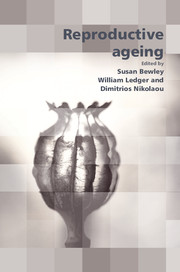Book contents
- Frontmatter
- Contents
- Participants
- Declarations of personal interest
- Preface
- SECTION 1 BACKGROUND TO AGEING AND DEMOGRAPHICS
- SECTION 2 BASIC SCIENCE OF REPRODUCTIVE AGEING
- SECTION 3 PREGNANCY: THE AGEING MOTHER AND MEDICAL NEEDS
- SECTION 4 THE OUTCOMES: CHILDREN AND MOTHERS
- SECTION 5 FUTURE FERTILITY INSURANCE: SCREENING, CRYOPRESERVATION OR EGG DONORS?
- 19 Screening for early ovarian ageing
- 20 Egg freezing: the reality and practicality
- 21 Assisted conception: uses and abuses
- 22 Future fertility insurance
- SECTION 6 SEX BEYOND AND AFTER FERTILITY
- SECTION 7 REPRODUCTIVE AGEING AND THE RCOG: AN INTERNATIONAL COLLEGE
- SECTION 8 FERTILITY TREATMENT: SCIENCE AND REALITY – THE NHS AND THE MARKET
- SECTION 9 THE FUTURE: DREAMS AND WAKING UP
- SECTION 10 CONSENSUS VIEWS
- Index
21 - Assisted conception: uses and abuses
from SECTION 5 - FUTURE FERTILITY INSURANCE: SCREENING, CRYOPRESERVATION OR EGG DONORS?
Published online by Cambridge University Press: 05 February 2014
- Frontmatter
- Contents
- Participants
- Declarations of personal interest
- Preface
- SECTION 1 BACKGROUND TO AGEING AND DEMOGRAPHICS
- SECTION 2 BASIC SCIENCE OF REPRODUCTIVE AGEING
- SECTION 3 PREGNANCY: THE AGEING MOTHER AND MEDICAL NEEDS
- SECTION 4 THE OUTCOMES: CHILDREN AND MOTHERS
- SECTION 5 FUTURE FERTILITY INSURANCE: SCREENING, CRYOPRESERVATION OR EGG DONORS?
- 19 Screening for early ovarian ageing
- 20 Egg freezing: the reality and practicality
- 21 Assisted conception: uses and abuses
- 22 Future fertility insurance
- SECTION 6 SEX BEYOND AND AFTER FERTILITY
- SECTION 7 REPRODUCTIVE AGEING AND THE RCOG: AN INTERNATIONAL COLLEGE
- SECTION 8 FERTILITY TREATMENT: SCIENCE AND REALITY – THE NHS AND THE MARKET
- SECTION 9 THE FUTURE: DREAMS AND WAKING UP
- SECTION 10 CONSENSUS VIEWS
- Index
Summary
Background
The demographic changes in childbearing in Western societies over recent decades have been detailed in previous chapters. More and more women are postponing pregnancy and thus experiencing infertility and pregnancy loss.
Fertility reduces with advancing age: this reduction becomes significant after the age of 35 years and fertility ceases several years before menopause. Observational studies among communities that do not practise contraception show similar results across different times and countries, summarised in Figure 21.1. The famous study by Tietze among the Hutterite community that was published in 1957 showed that 87% of couples were infertile by the age of 45 years. The rate is probably higher in modern Western societies owing to acquired causes of infertility such as chlamydial tubal damage, smoking and obesity.
Pregnancy loss becomes more common with advancing maternal age; indeed, the majority of conceptions to women in their 40s do not lead to a live birth. The rise in the rate of miscarriage is paralleled by the rise in chromosomal disorders in off spring of older mothers. The underlying factor is the increasing risk of genetic abnormality in the eggs of older women.
The evidence supports the Faddy—Gosden model of oocyte depletion. Whereas spermatogenesis is a continuous process in men, there is no genesis of eggs in women; the number of eggs is maximal in fetal life and there is a continuous decline thereafter. Egg loss becomes more rapid in the 40s and leads to complete loss of eggs and menopause around the age of 50 years. It is the reduction in egg quantity and quality that leads to age-related infertility and miscarriage.
Keywords
Information
- Type
- Chapter
- Information
- Reproductive Ageing , pp. 227 - 236Publisher: Cambridge University PressPrint publication year: 2009
